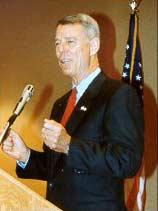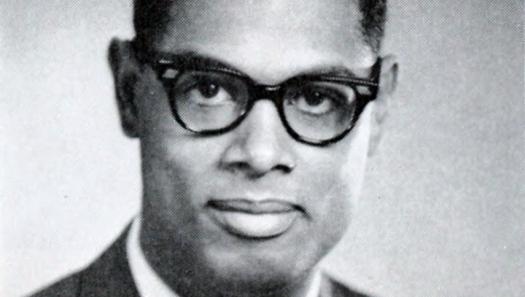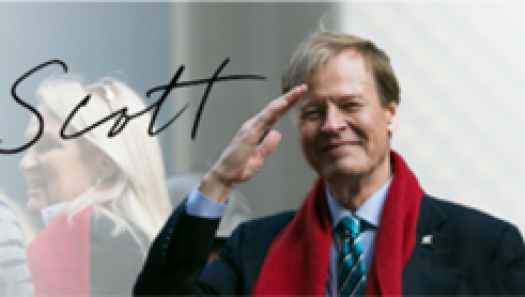WeSalute Awards
HeroVet: Bobby Hollingsworth, A Passionate Advocate for Members Of the Reserve and National Guard

About as far back as he can remember, way back when he was a tow-headed two-year-old on his daddy’s farm in rural Louisiana, a passion to be a pilot fired the imagination of Bobby Hollingsworth. When an uncle came home in his Navy whites with wings, fresh from flying an F-6 Hellcat in the South Pacific, Bobby knew, he knew, what he wanted to be.
Years later, as an undergraduate at Louisiana State University, when he was asked what he wanted to major in, his answer was eminently pragmatic: Whatever I’ve got to do to enhance my knowledge to become a pilot. He majored in electrical engineering.
During his Reserve career, he rose steadily through the upper ranks, becoming Commanding General of the Marine Corps Reserve Support Command; Deputy Commander of the Joint Force, Southwest Asia; and Vice Commander of Marine Forces, Pacific. In 1999, after 38 years of Reserve and active duty, Bob Hollingsworth retired as a Major General.

Bobby Hollingsworth talk about
deployment with National
Guardsmen attached to the
25th Infantry Division. (ESGR
photo by Maj. Hunt Kerrigan)
By then he was a grandfather, on the cusp of a well-deserved retirement. Building a home on land he and his wife, Sue, his high school sweetheart, owned in Colorado, beckoned; the idea of having the personal freedom to go bow-hunting and fly-fishing in the great outdoors was alluring. But Bob Hollingsworth was still passionate: about service to his country. He wasn’t quite ready to hang up his wings for good.
Motivated by an abiding sense of patriotism deeply rooted in his family and in small-town values, and moved by the ethos of the Corps, which he describes as "an organization that is not only dedicated to excellence as warriors but to the principle that we take care of our own," he heeded the sage advice of his Congressman, John Cooksey. "You need to come to Washington and do something," Cooksey, a former Air Force fighter pilot - and his wife’s eye doctor - told Hollingsworth.
He did. And in November 2001, in what he calls a "perfect fit," he was appointed by President Bush as Executive Director of the National Committee for Employer Support of the Guard and Reserve. ESGR, as it is commonly known, is an agency within the office of the assistant secretary of Defense for Reserve Affairs. It was established in 1972 by presidential proclamation to promote support, understanding, and cooperation between National Guardsmen and Reservists and their civilian employers. Six years later, it grew to include a community-based volunteer network that now numbers more than 4,100 volunteers in 54 communities located in each state, in the District of Columbia, Guam, Puerto Rico, and the U.S. Virgin Islands.
And it has provided Bob Hollingsworth with an outlet for his passion.
Making a Difference
"What we’re doing is helping people’s lives," he said during a telephone interview from his office in Arlington, Virginia. "God - and the President - put me here so I can influence attitudes and support the young men and women who are willing to put their lives on the line so we can live free." For Bob Hollingsworth, this is not a pious patriotic platitude; it’s something in which he deeply believes.
"Our national defense is completely dependent on volunteers," he said. "Most people don’t realize that 48% of our armed forces - 1.3 million men and women - are in the Guard and Reserves. They are critical to our nation’s security," he added, citing a 40% reduction in the active component strength over the past decade.
ESGR works to ensure that each Guardsman and Reservist is aware of their rights and responsibilities under the law, and whom to contact if they have employer-related problems. ESGR also provides an information and mediation service from it national headquarters. This "ombudsman" service provides a team of experts in the field of re-employment rights for members of the Guard and Reserve who have been trained in explaining the nuances of the law, addressing problems or misunderstandings with individual supervisors or employers, and fielding inquiries about specific personnel practices.
On the other end of the stick, ESGR reaches out to employers, to inform them of their rights and obligations as citizens, and to gain and reinforce their support of the nation’s Guardsmen and Reservists.

mobilized Reservists in Moron,
Spain, Jan. 31, 2003. The soldiers
were enroute to Kuwait. (ESGR
Photo by SFC Richard M. Arndt)
Through a variety of programs, Hollingsworth and company use the gentle art of persuasion to convince employers to do the right thing by their employees who have been called up to active duty. Hundreds of employers, from small businesses to giant corporations, have signed "statements of support" that endorse the principles and goals of ESGR.
Hollingsworth notes that of the thousands of queries that ESGR staff and volunteers field each week, "only 15% are real issue-related conversations, and then more often than not turn out to be a misunderstanding." Only a relative handful, around 5% of the calls, are referred to the Department of Labor.
While re-employment issues account for the bulk of all queries, "family issues are equally important," Hollingsworth said. "Guardsmen and Reservists do their duty and are willing to accept some major inconveniences, but get annoyed if they feel that a call-up is not equitable, that members of a particular Reserve unit are being asked to do more than their share."
Hollingsworth cites several success stories in which a business - and an entire community - come through for a member of the Reserve or the Guard. Like the Ford Motor Company, which defers car payments to Reservists or Guardsmen called to active duty.
There’s the Reserve sergeant, a truck driver for the Serta mattress company, who’s married with three kids and debts piling up, who is forced to take more than a 50% cut in pay when he was mobilized. ESGR contacted its state office in Tennessee, which in turn reached out to the chairman of Serta, who in effect ordered that his company match the differential in pay. There’s the Special Forces sergeant from Utah who lost an eye in Afghanistan. Delta Airlines, his wife’s employer, rallied around the family, helping to make up the pay differential. And there’s the civil engineer from New Jersey who was greeted upon his return home by a huge electronic sign in the lobby of his corporate headquarters.
In his present post, Hollingsworth is a mover and a shaker, a leader and a cheerleader, an ambassador of good will. He’s there to raise the level of conscience and consciousness for the sacrifices made by those who serve. And every day Bob Hollingsworth asks himself: "What did I do today that’s made a difference in somebody’s life?"
Most days, he can be pleased by the answer. Every day, his dedication makes a difference to our country.
For more information about the programs of ESGR, visit their Web site at www.esgr.org. Ombudsmen can be reached via the Web site or at ESGR’s toll-free number, 1 (800) 336-4590.



